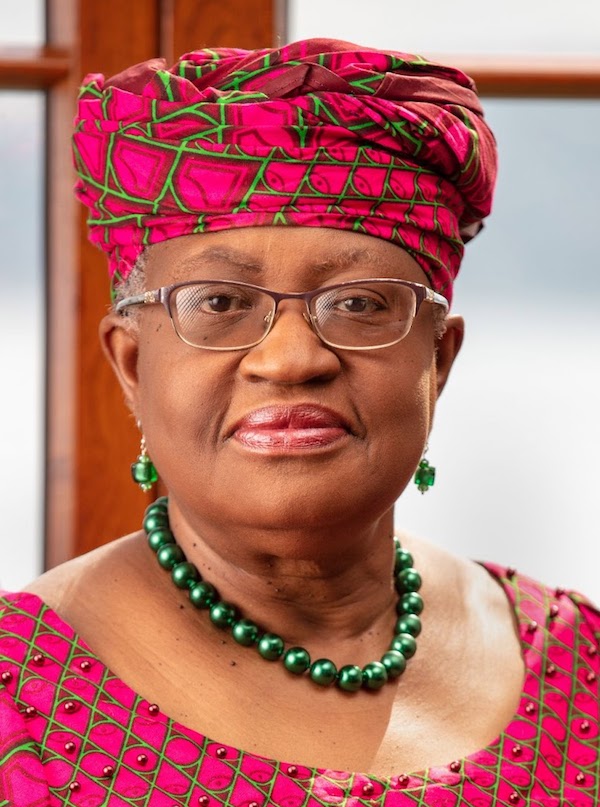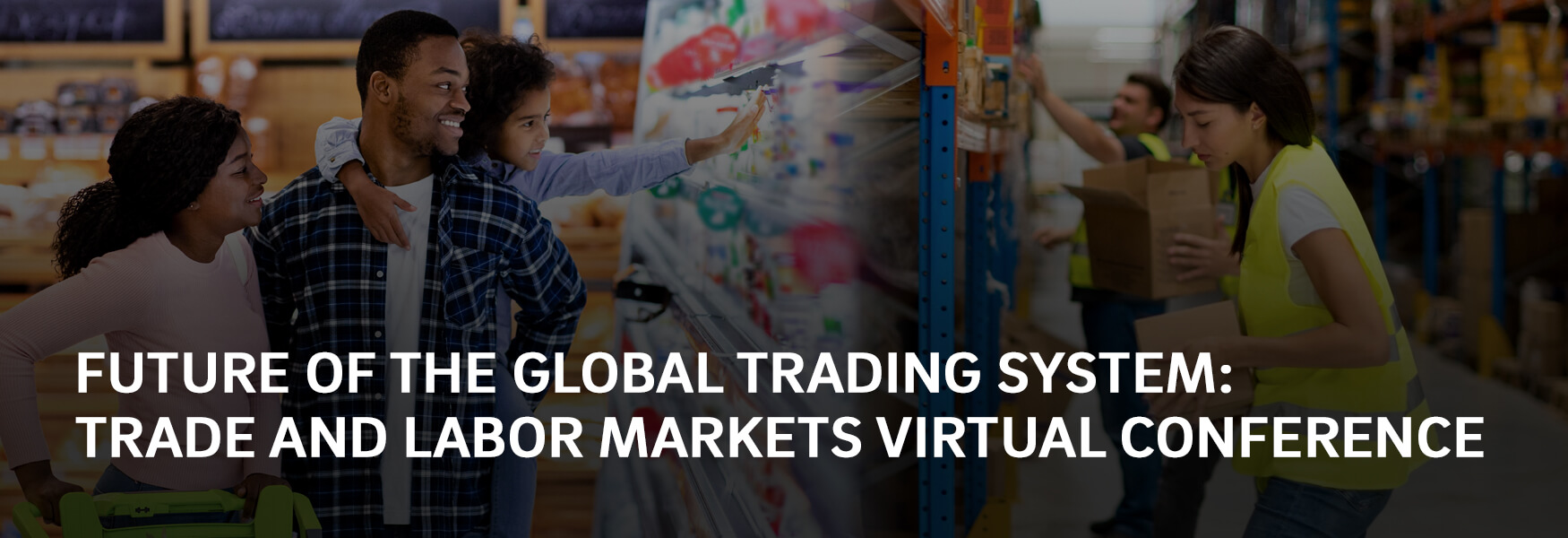Future of the Global Trading System: Trade and Labor Markets Virtual Conference
Friday, Feb. 25, 2022
8 a.m.-1 p.m. PST
UC San Diego School of Global Policy and Strategy
Sponsored by the Center for Commerce and Diplomacy
Conference Overview
The purpose of this conference was to address rising inequality in the U.S. labor market and its consequences for international trade. Global economic integration and technological change have generated serious challenges for labor markets in high income countries. Low-skilled workers in manufacturing communities have been left behind, while high-skilled workers in urban metro areas have reaped enormous gains. Although wages at the bottom of the income distribution have risen during the pandemic, practical long-term solutions are needed to address long-term labor market frictions and revitalize support for open markets. We aim to develop such solutions in this conference.
We invited three groups of experts to this discussion: academics, business leaders, and policymakers. We focused on three aspects of labor markets that have particular relevance for international trade: Labor Standards in Trade Agreements, Trade and Union, and Place-Based Policies and Workforce Development.
Global Leaders Forum
The conference began with a public Global Leaders Forum event. The forum brings world leaders to UC San Diego to share insights on current trends in global policy and politics, leadership and life lessons. We are honored to have hosted Dr. Ngozi Okonjo-Iweala, Director General of the World Trade Organization, the first woman and first African to hold the position. She is an economist, served twice as Nigeria’s Finance Minister, and has been ranked by Fortune magazine as one of the 50 Greatest World Leaders (2015).
Download the conference program (PDF)
Download the takeaways document (PDF)
Global Leaders Forum Details
CCD Global Leaders Forum
Fireside Chat: The Role of the WTO in Ensuring Trade Works for All
Dr. Ngozi Okonjo-Iweala, Director-General of the World Trade Organization (WTO)
Feb. 25, 2022

Dr. Ngozi Okonjo-Iweala is the Director-General of the World Trade Organization (WTO). She is an economist and international development expert with over 30 years of experience. She was Chair of the Board of Gavi, the Vaccine Alliance (2016 – 2020), the African Risk Capacity (2014 – 2020) and Co-Chair of The Global Commission on the Economy and Climate. Previously, she served as Senior Advisor at Lazard and sat on the Boards of Standard Chartered PLC and Twitter Inc.
Okonjo-Iweala was appointed as an AU COVID-19 Special Envoy and WHO COVID-19 Special Envoy. She served twice as Nigeria’s Finance Minister (2003-2006, 2011-2015), the first woman to hold the position, and spent a 25-year career at the World Bank rising to the No. 2 position of Managing Director. In 2020, she was named Forbes African of the Year. She has been ranked by Fortune as one of the 50 Greatest World Leaders (2015) and by Forbes as one of the Top 100 Most Powerful Women in the World consecutively for four years. She holds a Bachelor’s in Economics from Harvard University and a Ph.D. from the Massachusetts Institute of Technology. Read the full biography here.
Invitation-only Conference Details
9:35-9:40 a.m. Welcome and Introduction
- J. Lawrence Broz, Associate Director, Center for Commerce and Diplomacy; Professor of Political Science, UC San Diego
9:40-10:40 a.m. PANEL 1: LABOR STANDARDS IN TRADE AGREEMENTS
A growing number of trade agreements, including the USMCA, contain labor provisions that commit trading partners to maintain minimum standards for the protection of workers; the USMCA also strengthened the labor dispute resolution system and consultation procedures. Are labor clauses a viable path to improving labor market outcomes?
Panelists:
- Desiree LeClercq, Proskauer Employment and Labor Law Assistant Professor, School of Industrial and Labor Relations, Cornell University
- Christopher Landau, Former United States Ambassador to Mexico
- Jeff Immelt, Venture Partner, New Enterprise Associates; Former CEO, General Electric
Moderator: Charles Dallara, Advisory Partner and Chairman, Partners Group USA
10:40-11:40 a.m. PANEL 2: TRADE AND UNIONS
There is broad consensus that labor’s share of national income has been declining for decades. Some argue that trade-related de-unionization is part of the story. Can re-unionization be a part of the solution to the hollowing out of middle-skilled jobs without a retreat from globalization? What is the role of unions in an economy where labor is more increasingly considered skill-specific versus industry specific?
Panelists:
- Gordon Hanson, Peter Wertheim Professor in Urban Policy, Harvard Kennedy School
- Thea Lee, Deputy Undersecretary for International Affairs, U.S. Department of Labor
- Leila Aridi Afas, Director, International Public Policy, Toyota North America
Moderator: John Ahlquist, Professor, UC San Diego School of Global Policy and Strategy
11:40 -11:45 a.m. Break
11:45 a.m.-12:45 p.m. PANEL 3: PLACE BASED POLICIES AND WORKFORCE DEVELOPMENT
Place-based policies aim to address geographic disparities in economic performance by targeting resources to underperforming areas. But what are the most effective approaches to narrowing the gap between the best- and worst-performing communities? Workforce development refers to public and private efforts and partnerships to train and retain a viable workforce for the 21st century. Can workforce development create shared economic prosperity for workers, businesses and communities and mitigate employment and community losses due to trade?
Panelists:
- Nina Pavcnik, Niehaus Family Professor in International Studies and Professor of Economics, Dartmouth College
- Ann Fandozzi, Chief Executive Officer, Ritchie Bros.
- Susan Davis, Former U.S. Representative, California’s 53rd Congressional District
Moderator: Renee Bowen, Director, Center for Commerce and Diplomacy; Professor, School of Global Policy and Strategy and Department of Economics, UC San Diego
12:45 - 1 p.m. Closing Remarks
J. Lawrence Broz, Associate Director, Center for Commerce and Diplomacy; Professor of Political Science, UC San DiegoBackground Readings
Desiree LeClercq
Desiree LeClercq, "Biden's Worker-Centered Trade Policy: Whose Workers?," International Economic Law and Policy Blog, May 16, 2021.
Desiree LeClercq, "Fit for Whose Purpose?: How Panelists Interpret Labor Rights in Trade, and What That Tells Us about the Trade/Labor Relationship," International Economic Law and Policy Blog, January 2, 2022.
Gordon H. Hanson
Gordon Hanson, "Can Trade Work for Workers?," Foreign Affairs, 2021, 20-27.
Gordon Hanson, "The China Shock's Lessons for the Green Economy," Foreign Affairs, November 8, 2021.
T. Renee Bowen and J. Lawrence Broz
T. Renee Bowen, J. Lawrence Broz, B. Peter Rosendorff, "Trade Policy Transitions: Three Eras of U.S Trade Policy," Working Paper, February 14, 2022.
T. Renee Bowen, J. Lawrence Broz, and Marc-Andreas Muendler, "The World Trade Organization and U.S. Domestic Politics," Working Paper, April 8, 2021.
Steve Lohr, "Economists Pin More Blame on Tech for Rising Inequality," New York Times, January 11, 2022.
Edward Alden, "Why Gains for U.S. Workers Are Good for the World," Foreign Policy, January 20, 2022.
Nina Pavcnik
Nina Pavcnik, "The Impact of Trade on Inequality in Developing Countries," Jackson Hole Symposium Proceedings, 2017.

